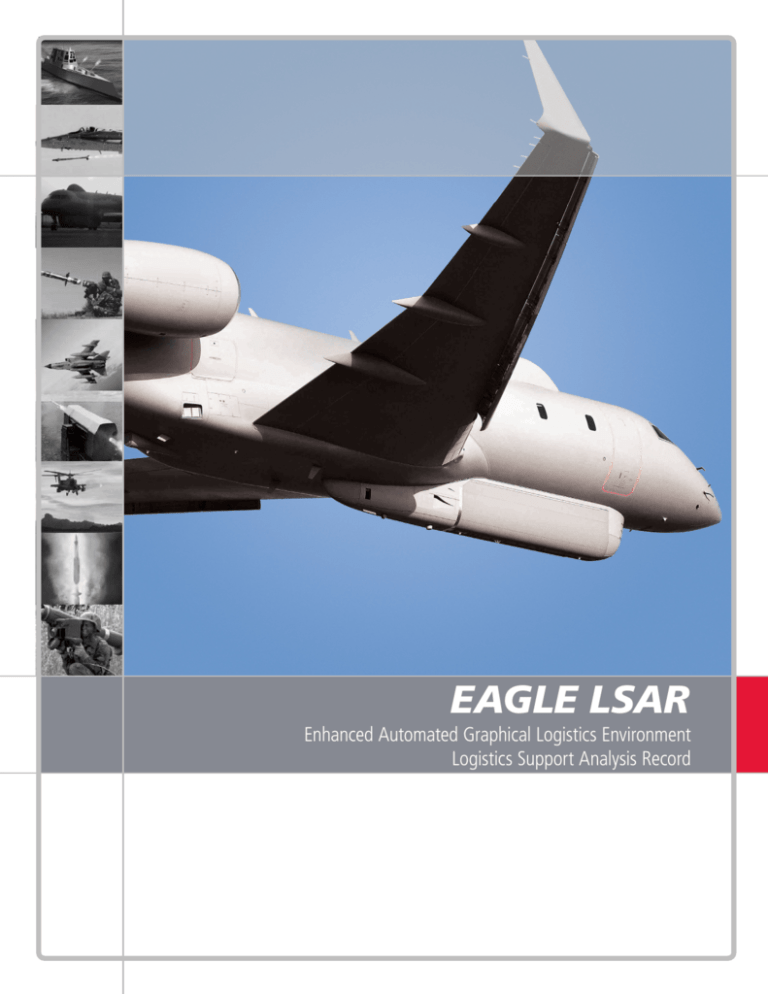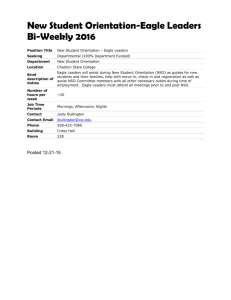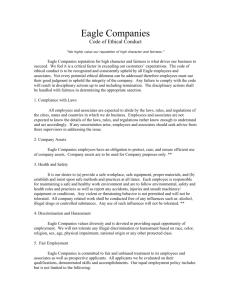
EAGLE LSAR
Enhanced Automated Graphical Logistics Environment
Logistics Support Analysis Record
Table of Contents
Enhanced Automated Graphical Logistics Environment (EAGLE)
Logistics Support Analysis Record (LSAR)
Introduction.........................................................................................................................1
EAGLE Disciplines.................................................................................................................3
AdHoc............................................................................................................................ 3
Administration................................................................................................................ 4
Breakdown Structure....................................................................................................... 6
Facilities.......................................................................................................................... 9
Graphics......................................................................................................................... 7
LCN Maintenance............................................................................................................ 7
LSA Management............................................................................................................ 8
Operations Maintenance.................................................................................................. 8
Personnel Skills............................................................................................................... 8
Provisioning.................................................................................................................... 9
RMT Management........................................................................................................ 10
Reliability and Maintainability.........................................................................................11
Reports......................................................................................................................... 12
Support Equipment....................................................................................................... 13
Task Analysis................................................................................................................. 13
Tech Data Module Maintenance..................................................................................... 15
Tech Manual................................................................................................................. 16
Training Analysis........................................................................................................... 17
Transportation............................................................................................................... 18
User Reports................................................................................................................. 18
Wizards........................................................................................................................ 18
Other EAGLE Products........................................................................................................ 19
EAGLE Web.................................................................................................................. 20
EAGLE Publishing System............................................................................................... 21
Maintenance Management Information System (MMIS)................................................... 22
Summary............................................................................................................................23
More Information...............................................................................................................23
i
EAGLE LSAR
Introduction
Enhanced Automated Graphical Logistics Environment (EAGLE) is a technologically innovative
logistics toolset employing a robust central database as the repository for all logistics products developed through Logistics Support Analysis (LSA).
Research shows that over the whole life cycle of a product, the cost of acquisition is small compared
to the cost of support, both in financial terms and the lost availability of assets during operations.
Product Reliability and Maintainability has huge implications on the overall cost of ownership. Thus,
investment in these areas will be saved many times over the lifetime of the product.
Integrated Logistics Support (ILS) is a methodology adopted by the United States Department of
Defense (DoD), United Kingdom Ministry Of Defence (MOD) and many other countries. ILS defines
a structured approach to logistics ensuring that all support resources necessary to operate and maintain equipment through its life are correctly identified and are consistent with the proposed product
design and support environments.
The goal of ILS is to deliver the initial support package and ensure continued optimization of the
support solution in response to product modifications and changes in performance requirements.
Feedback from operational use and experience as well as changes in the Concept of Operations
(CONOPS) will also require the existing support system to be reexamined.
1
EAGLE LSAR
The optimum support solution is determined through LSA that is a set of methods generating data
and support products such as technical manuals, provisioning lists, LSA reports, training needs and
all other considerations necessary to field and support the equipment. The results of LSA can be
stored in a database known as the Logistics Support Analysis Record (LSAR).
EAGLE is fully compliant with the published LSAR specifications MIL-STD-1388-2B, GEIASTD-0007, MIL-PRF-49506 and DEF STAN 00-60. It also supports the latest application of ILS
principles specified by the United Kingdom MOD in DEF STAN 00-600 and JSP 886 Volume 7.
The world-class EAGLE logistics toolset is used by over 1500 logistics engineers in 60 companies
across 20 countries. In addition to providing functions for the analysis and reporting of logistics
support decisions, it encompasses a suite of analytical tools and utilities including the automatic
generation of maintenance manuals to the requirements of ASD S1000D, MIL-STD-40051 and MILDTL-87929C as well as enabling online data commenting by permitted reviewers through EAGLE
Web.
It is built to satisfy the most stringent customer mandated requirements and is easily configured and
flexible to assist the user. It is a system designed to link the real worlds of engineering, design and
production and is the only fully integrated product that ties the technical manuals directly to the
engineering and LSA data.
The following gives a brief overview of the EAGLE disciplines used to manage information across
more than 20 current system areas. The disciplines shown on the menu can be made available or
hidden from each specific user appropriate to the their roles in the program.
2
EAGLE Disciplines
EAGLE Disciplines
AdHoc
The AdHoc tool allows users to create and run queries against the complete EAGLE database and generate reports based on particular needs. User friendly screens assist in quickly producing the correct SQL
query statement (without user knowledge of SQL), that can be based on any EAGLE tables and fields
and includes selection and sort criteria. The query can be saved locally or to the EAGLE database for
access by all users. The AdHoc tool allows direct changes to be made to the data in the results window.
The results can also be saved to spreadsheets and data can be pasted into the database from spreadsheets.
3
EAGLE Disciplines
Administration
Under the Administration discipline, users can customize nearly all of the EAGLE program functions. For example, system defaults can be set to predetermined or individually chosen levels.
Altering these options changes the look and feel of the EAGLE user interface.
Options are available to export and import LSAR full file or change only datasets as text files or
XML data exchange files. Any MIL-STD-1388-2B or DEF STAN 00-60 compliant full file can be
imported into EAGLE. Output formats can be text or XML data exchange files in MIL-STD-13882B, DEF STAN 00-60, GEIA-STD-0007, or EAGLE proprietary formats.
4
EAGLE Disciplines
EAGLE Analysis Reports
EAGLE Analysis Reports is a powerful function with the ability to detect data errors and inconsistencies by running over 100 individual analysis routines against the database. The LSAR Completion
Status Report provides an indication of how much data has been recorded in the LSAR and tracks
completion progress.
In short, the Administration function gives the power and flexibility to customize EAGLE’s functions to any specific user needs.
5
EAGLE Disciplines
Breakdown Structure
The Breakdown Structure discipline presents the Logistic Support Analysis Control Number (LCN)
structure of an end item graphically with a hierarchical parent-child view. The breakdown can be
based on either LCNs or part application. Parts or LCNs can be moved to other locations in the
structure. Many EAGLE disciplines can be accessed directly from the data selected in the breakdown.
Facilities
The Facilities discipline provides functions for manipulating data related to maintenance facility considerations identified during through the LSA process. This information justifies and describes all
proposed and additional facilities requirements that are indicated as a result of the operational and
maintenance task analysis based on the concept of operations and maintenance policy.
6
EAGLE Disciplines
Graphics
The Graphics discipline provides the
ability to store and retrieve technical
drawings and artwork in a variety of
formats. Graphics can be associated
with specific parts in the LSAR and
used in the production of illustrated
parts documentation.
Image Viewer is an EAGLE tool that
quickly converts graphic file types
to CGM and enables markup and
hotspot regions to be easily added and
modified. The modified graphics can
be stored in the EAGLE graphics database or used with the EAGLE Publishing System (EPS) technical manual
authoring environment.
LCN Maintenance
The LCN Maintenance discipline
provides a method of manipulating
and maintaining top level LSAR data
sets used at the project level and enabling global key field changes. Some
of the tables that are managed from
this discipline are; the End Item Acronym Code Table (XA), LCN Indentured Item Table (XB), Commercial
and Government Entity Table (XH),
Item Identification Table (HA), the
Part Application Provisioning Table
(HG).
In addition, this discipline provides a bill of materials (BOM) import tool that fills the LSAR tables
from a spreadsheet, automatically generating LCN data as necessary.
7
EAGLE Disciplines
LSA Management
The LSA Management discipline provides tools to manage the LSA processes, including engineering
change management, parts application life expectancy information, support equipment management information and additional task management information.
Operations Maintenance
The Operations Maintenance discipline provides functions for managing data related to the anticipated operation of the system, the environment in which the system is to be maintained, and the
maintenance requirements of the system which must be met. Operational usage rates and maintenance requirements for war and peacetime are recorded with this discipline as well as reliability and
interoperability requirements with associated costing data. These data elements are used in life cycle
cost modeling and other calculations.
Personnel Skills
The Personnel Skills discipline tracks the description and justification of any new or modified personnel skills required to operate and maintain the product. The areas addressed are skill specialty
codes, personnel skills and the identification of any unique physical or mental personnel attributes
required or recommended as prerequisites for the applicable task.
8
EAGLE Disciplines
Provisioning
Provisioning is the process of determining and acquiring the range and quantity of necessary spares
and repair parts as well as identifying the support and test equipment required to operate and maintain equipment for an initial period of service. The Provisioning discipline provides the analyst with
detailed provisioning data that assists in making crucial sparing recommendations.
9
EAGLE Disciplines
The EAGLE Provisioning Analysis function is used to analyze the provisioning data in the database
for a variety of missing data table entries. It creates reports to identify areas that require attention to
ensure the accuracy of the provisioning recommendations.
RMT Management
The Reliability Maintainability and Testability (RMT) discipline is based on the methodology of
performing analysis on the data in the existing LSAR using the included toolkits. From the analysis
data, a new LSAR is produced as a baseline for the production of a new system. The RMT system is
a response to the business need to reduce the time required to bring a new product to market with
reduced costs and improved availability.
10
EAGLE Disciplines
Reliability and Maintainability
The Reliability and Maintainability discipline is used to record and edit all of the information concerned with the reliability and maintainability aspects of a part including RAM characteristics,
logistics considerations, reliability characteristics, war and peace requirements, failure modes and
reliability centered maintenance analysis.
11
EAGLE Disciplines
Reports
EAGLE produces all of the standard LSA reports defined by the specifications in addition to a nearly limitless range of custom reports that can be created and made available to all users. The Reports
discipline provides a simple, yet powerful and flexible method to generate the standard reports
from the LSAR. Users are assisted with the report generation by data entry windows that show the
information required to run the requested report and prompt for additional optional information
used to tailor the report.
12
EAGLE Disciplines
Support Equipment
The Support Equipment discipline tracks data relating to support, test and training equipment.
This information serves as administrative data for generating
the formal Support Equipment
Requirements Document (SERD)
reports. This information also
identifies hardware and software
elements required to conduct
fault isolation. In addition, the
Support Equipment function can
automatically generate standard
LSA reports such as the LSA-070
and FORMS 9 and 603.
Task Analysis
The Task Analysis discipline is
used to capture all logistics support information required to perform corrective and preventive
maintenance tasks. This includes
determining what spares, personnel, support equipment, task
narrative and other logistics considerations are required by referencing other resources stored in
the LSAR. Tasks can be associated
with ASD S1000D data modules
or MIL-STD-40051 work packages and the support resources and
narratives are used to automatically populate the technical manual
directly from the LSAR data.
13
EAGLE Disciplines
LSAR task narrative text is automatically converted to XML, compliant with the chosen technical
manual specification. Graphics, multimedia, hotspots and hyperlinks are easily added to the content
using features of the EAGLE Publishing System technical manual authoring environment.
14
EAGLE Disciplines
Tech Data Module Maintenance
The Tech Data Module Maintenance discipline provides management functions to maintain the
associations between the EAGLE LSAR tasks and the EAGLE Publishing System technical manual
authoring environment. LSAR task data can be released using this discipline to directly populate
the technical manual data, change marks can be automatically generated and a complete release
history is maintained.
15
EAGLE Disciplines
Tech Manual
The Tech Manual discipline provides functions for manipulating data related to technical manual
production from the LSAR data including references to test requirements documents. Various types
of technical manuals can be created in virtually any format utilizing existing data in the EAGLE database. The LSA task is linked to the appropriate location in the specified manual structure. EAGLE
creates structured XML from the associated LSA information that can be produced as Interactive
Electronic Technical Manuals (IETP) or as legacy style PDF documents.
Another powerful feature of EAGLE is the ability to generate Illustrated Parts Breakdown (IPB) and
Repair Parts and Special Tools List (RPSTL) technical data directly from the LSAR provisioning
data.
Parts are selected for inclusion in the illustrated parts list from the provisioning data and the required illustrations are associated with the list. The edit function enables additional data fields to be
added and the parts list order to be changed to match the illustration callout numbers. Extracting
the parts data automatically populates the associated technical manual elements creating hotspot
hyperlinks between the text and illustrations.
16
EAGLE Disciplines
Training Analysis
The Training Analysis discipline provides functions for determining training requirements including the processes, procedures, techniques, and equipment used to train active and reserve personnel to operate and support the product. This includes individual and crew training, new equipment
training, and logistics support for the training devices themselves.
17
EAGLE Disciplines
Transportation
The Transportation discipline tracks transportability engineering analysis data as part of Packaging, Handling and Transportation (PHS&T) that pertains to the requirements necessary to safely
and efficiently transport items around the globe.
User Reports
The User Reports discipline provides similar functionality to the AdHoc query generator, allowing
users create and run queries against the complete EAGLE database, generating reports based on a
particular need. User friendly screens assist in quickly producing the correct SQL query statement
that can be based on any EAGLE tables and fields. The query can be saved to the EAGLE database
for access by all users. The results window data can be saved to other file types. However, unlike
the AdHoc discipline, the User Reports results data cannot be changed or deleted and the query is
optimized to run very quickly.
Wizards
The Wizards discipline provides functions to automatically perform actions on the LSAR data including running automatic calculations, calculating quantity per end item, bulk loading of graphics
files into the database and calculating LCN indenture codes.
18
Other EAGLE Products
Other EAGLE Products
ILS is applicable throughout the whole life of a project, however the focus changes as the project
progresses through the Concept, Assessment, Demonstration, Manufacture, In-Service and Disposal
(CADMID) phases of the product life-cycle. EAGLE has products that support every phase of the
project. The following is a short overview of these. The specific product guides give a more detailed
explanation of these applications.
EAGLE Toolset Overview
19
Other EAGLE Products
EAGLE Web
EAGLE Web is a completely thin-client online application that gives complete access to the EAGLE
LSAR data and allows editing, inserting and deleting of data as controlled by access permissions. It
facilitates review and commenting of data by external agencies and manages review responses through
a web page. It provides the capability to generate standard LSA reports and AdHoc reports from the
data just like the EAGLE client. The document management utility supports the storage and recall of
documents and generated reports.
20
Other EAGLE Products
EAGLE Publishing System
EAGLE Publishing System (EPS) is a robust, yet intuitive environment for the authoring and management of XML data used in the production of ASD S1000D and MIL-STD-40051 electronic technical
manuals. More than a decade of expertise in the generation of electronic technical manuals directly
from current LSAR data has gone into the development of the EPS. Designed by users for users, it is a
fast, efficient and user friendly application to produce and manage publications, either in conjunction
with logistics information or authored directly and not linked to LSAR data. Content Management
System (CMS) procedures are used to manage the work flow in a collaborative environment.
21
Other EAGLE Products
Maintenance Management Information System (MMIS)
The EAGLE Maintenance Management Information System (MMIS) is a computerized maintenance
management system designed to integrate, manage and optimize all aspects of Performance Based
Logistics (PBL) and Contract Logistics Support (CLS) programs. It uses the existing LSAR data developed during the product development as the equipment baseline and manages the product through
its operational life. It has the capability to fuse data generated by repair facilities, forward depots,
customers, subcontractors, and field representatives by providing a common data repository that is
accessed globally.
MMIS provides essential process visibility and data transparency with easy, secure access to data over
the Internet; all program personnel can view equipment status, repair status, and generate reports with
nothing other than a browser. As a result, vital information is available to the office, PDAs and Web
enabled cell phones in the field. A user configured dashboard provides constantly updated key data,
presented in graphical formats.
22
In Conclusion
Summary
EAGLE is a suite of software tools used to develop optimum logistics solutions for the operation and
support of equipment throughout its lifecycle, from initial concepts to disposal.
End users are focused on availability, supportability and lifecycle costs. More than ever, long term
support planning and guaranteed availability of equipment and spares is essential for deployed operations. These goals remain foremost, whether support is provided organically or through contracting for
Performance Based Logistics (PBL) or Contractor Logistics Support (CLS).
Despite changes in contracting and technological advances, the basic support needs for fielded equipment
have not changed. Deployed systems still need technical publications (probably interactive electronic
format), spares, tools, facilities and training for their safe and effective operation and maintenance at
the correct levels of the supply chain.
Equipment tracking, configuration management and timely repairs are crucial to maintaining availability and the operational effectiveness of fielded equipment. The EAGLE products provide the tools
necessary to determine and generate all the support requirements and manage fielded equipment in
a completely integrated environment. Data gathered and analyzed during design is directly used to
produce operation and maintenance manuals. The same data is used as the basis to manage the equipment configuration, location, repair, reliability growth and more through the operational life.
More Information
Additional information about Raytheon EAGLE products and services can be found on the EAGLE
website at www.raytheoneagle.com.
The Raytheon EAGLE development team is located in Tucson, Arizona USA. To ask questions, request further information or clarification, please contact the Raytheon EAGLE help desk by email at
raytheoneagle@raytheon.com or call +1.520.663.6673.
To discuss your specific requirements or place an order, please contact the EAGLE program manager,
Anthony Zucco by email at afzucco@raytheon.com or call his office at +1.520.545.6885.
23
Raytheon Technical Services
Company LLC
TU, Building M11, MS1
6223 South Palo Verde Road
Tucson, AZ
85706 USA
+1.520.663.6573 phone
+1.520.545.6878 fax
raytheoneagle@raytheon.com
www.raytheoneagle.com
Copyright © 2005-2011 Raytheon Company. All rights reserved.
EAGLE LSAR Product Guide April 2011 AM 4285541




